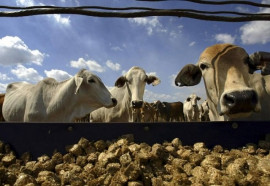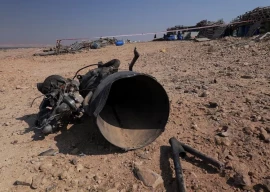
ISLAMABAD: While the Islamabad Capital Territory (ICT) administration seems satisfied with its anti-dengue efforts, health experts are much less convinced.
They claim that solid waste dumps spread across the city serve as the “most favourable” breeding grounds for mosquitoes (including those that carry the dengue virus), and as long as measures are not taken to properly dispose of waste, the ICT administration’s measures will remain ineffective.
Talking to The Express Tribune, Dr Muhammad Saleem Rana, a vector control expert and associate professor at Health Services Academy, said it is impossible to control the spread of dengue without proper disposable of solid and liquid waste.
He explained that when rainwater is accumulated in disposed bottles, shopping bags and even on broken crockery, it serves as a safe spot for dengue mosquitoes to lay eggs. Hence, he said it is integral to the success of a dengue prevention campaign that solid waste dumps are properly managed.
A survey by The Express Tribune revealed a staggering number of garbage dumps in the city’s rural areas, some makeshift rubbish rumps defiantly sat outside rural health centres.
World Health Organization’s (WHO) Focal Person for Vector Control, Dr Qutbuddin Kakar, said the ICT administration lacks the mechanism to properly dispose of solid waste, adding that is not only contributing to the spread of dengue but also of other communicable diseases.
He urged the ICT administration to implement a proper solid waste management plan to ward off the lurking threat of dengue in the upcoming monsoon.
According to Islamabad District Health Officer Dr Muhammad Azhar, fumigations have been conducted all across Bhara Kahu, and the exercise will be extended to other rural areas of the city. He said that after completing the fumigations, anti-dengue sprays will be conducted in identified dengue hotspots, from where most of the cases of the disease surfaced last year.
When contacted, Islamabad Deputy Commissioner (DC) Amir Ali Ahmed accepted that improper disposal of solid waste in rural Islamabad aids in the spread of communicable diseases; however, he denied that water accumulated in solid waste contributes to the spread of dengue.
His only concern was the shortage of staff to conduct fumigation in basic health units across the city.
The DC said that the ICT administration has chalked out a plan for safe disposal of solid waste from rural areas, which will be launched once the required Rs10 million are released for the project. He said the funds are expected to be released in April, and assured that work on the project will be started immediately.
Around 50% of the dengue cases reported from Islamabad last year were from the rural areas.
Published in The Express Tribune, April 2nd, 2012.














































COMMENTS
Comments are moderated and generally will be posted if they are on-topic and not abusive.
For more information, please see our Comments FAQ